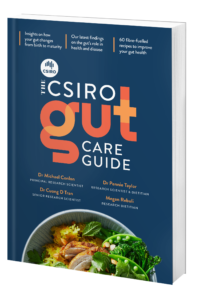
Improve your gut for health and wellbeing with our new book, The CSIRO Gut Care Guide.
Do you know the importance of gut health on your overall health? Emerging research shows the health of your gut influences numerous health problems. And having a healthy gut can benefit health concerns.
Your gut houses your microbiome and helps with many processes. Examples include digesting food, thinking clearly and maintaining a healthy weight range are all dictated by your gut.
Our new book, The CSIRO Gut Care Guide, shows you how to improve your gut health for overall wellbeing. We outline some of the ways your gut health influences your overall health.
Gut feeling
The gut and brain constantly talk to each other about digestion, substances in the gut, and if energy stores are running low. There is emerging evidence that shows the gut can influence the brain and affect mood and anxiety levels.
Healthy gut, healthy liver
Non-alcoholic fatty liver disease occurs when fat deposits in the liver. It is associated with increased gut permeability and is connected to changes in the gut microbiome. As a result, non-alcoholic fatty liver disease contributes to obesity and metabolic disease. If left unchecked, non-alcoholic fatty liver disease can progress to non-alcoholic steatohepatitis – another disease which can lead to chronic liver disease.
The skin you’re in
Your skin and gut lining share the job of acting as a barrier. They block unwanted organisms from entering your body. Research shows a disturbed gut microbe and/or a leaky gut may contribute to skin conditions like dermatitis, psoriasis and acne.
Can maintaining good gut health help prevent disease?
We all know that eating well can go a long way towards keeping our bodies healthy. Having a healthy gut environment can lead to a decreased risk of a range of diseases, including bowel cancer, type 2 diabetes and obesity.
Gut and immune health
There’s a strong connection between your gut and your immune system. Our gut is actually our body’s first line of our immune system. Besides its role in digestion and helping to absorb nutrients, our gut acts as a physical barrier, preventing pathogens and toxins from entering our system.
Our gut is also home to a host of complex microbiome communities. These microbes have been shown to influence the immune functions both within the gut and other parts of our body.
Pancreatic health
The pancreas is a major organ fundamental to metabolic health. Increased gut permeability can disrupt the normal functioning of the pancreas. When bacteria leak from the gut to the pancreas, inflammation in the tissues of the pancreas occurs. Excessive alcohol intake may also inflame the pancreas.
Type 1 diabetes
Type 1 diabetes is an autoimmune disorder where your pancreas doesn’t produce enough insulin. People with type 1 diabetes report increased intestinal permeability, which even precedes the clinical onset of disease. As a result, this suggests the integrity of the microbiome and the small intestine may play a role in type 1 diabetes.
Type 2 diabetes

The CSIRO Gut Care Guide.
Type 2 diabetes appears to be associated with increased intestinal permeability. Evidence suggests there are differences in the gut microbial of people with type 2 diabetes, compared to people who don’t have this disease.
Three things you can do to maintain good gut health and help prevent disease
- Maintain a healthy diet
- Avoid process and sugary foods
- Take a good quality probiotic
Our new Gut Care Guide has been written by our scientists. It gives you all the facts you need to know to boost and revitalise overall health by transforming your gut health.


2nd September 2021 at 10:35 am
Would like to see more about generating biome diversity AND discuss topic the effects of appendectomy on gut health, having heard that the appendix could well be the reservoir to re-establish micro-biomne after illness, bit what happens if it has been removed?
4th September 2021 at 12:58 pm
I second that thought, the appendix has always been thought of, or looked at, as “unnecessary”, or so I have been told over the years. Answers always do reside in us….